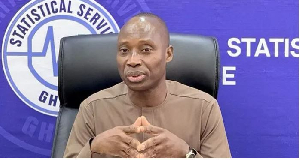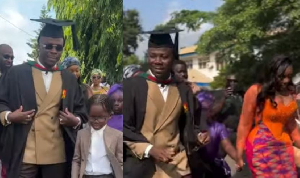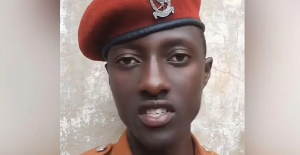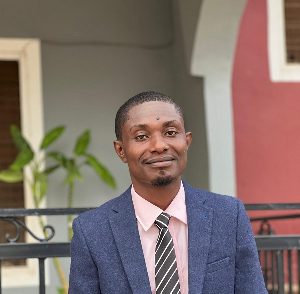J.H MENSAH BREAKS SILENCE ON ‘FREE SHS’
-Says we are throwing education into the gutter
Veteran politician and elder statesman, Mr. Joseph Henry Mensah has been grieving over on-going debate over whether senior secondary education should be free, accessible and or qualitative. Hon. J.H Mensah, who was one of the leading economists that served modern Ghana from its early days, and served as a Senior Minister in the Kufuor administration, says he has refused to comment on the debate until now because of the uninformed nature of the arguments. Hon. J.H. Mensah, a revered statesman and NPP stalwart, who was the first to advocate for a debate on free/quality education in the Ghanaian Parliament, when he was a Member of the House, stated then in unambiguous terms that; ‘there is no free lunch anywhere in the world”. The septuagenarian old-hand politician, prior to exiting Parliament in 2008 stated on the floor of the House that the Free component in the FCUBE (Free Compulsory Universal Basic Education) is not as important as the Education, insisting, “it (education) can never be free anyway to the whole nation, because the whole nation has to pay, it is only free at the point of delivery”. He argued that “the important part of the concept of the FCUBE is that all our children should be properly educated, and that means the content of the education, the books and the teacher quality”. But speaking in an exclusive interview with The Al-Hajj over the weekend in Accra on his opinion over the on-going debate on free SHS education, the much respected J.H. Mensah, now a member of the New Patriotic Party Council of Elders said: “There has been so much talk on the education scene with too many divisions-we are throwing education to the gutter and I don’t want to add or interfere…” According to the erudite politician, though the fundamental prerequisite of getting the 17 and 18-year olds in class is not in doubt, the main policy thrust should be the training of the child. He said it is important we focus on the bigger picture on education in Ghana today without any constraint about affordability, insisting “financing and affordable must be the next step”. Lamenting further on education financing vis-à-vis lack of text books in our JHS on the floor of Parliament, Mr. Mensah argued convincingly: “if it’s going to cost billions and billions of Cedis to give our children text books let us confront the problems because it is necessary that they shall have text books”. Adding that; “and if it means calling on parents to make a contribution, let’s not be afraid to do so, we are obsessed with the idea of free things, Mr. Speaker, there is no free thing, as I keep saying in this house..”. Below is a transcript of text of Hon. J.H Mensah’s address on education in Ghana’s Parliament.
Transcript of a profound and prophetic statement by Hon. J.H Mensah’s on the floor of Ghana Parliament 2008.
“Mr. speaker the other day, I had the temerity to tell very important people at Legon, that as of today, the majority of our children in our basic schools do not have a full set of text books with which they can learn Science and English and mathematics and all those things, not a full set of books to read, and Mr. speaker, we are trying to conduct this magic of education without reading, so the school books are locked up by the teacher at the end of the day, because there are only ten to a class of forty, the teacher comes and write a lot of things on the black board and then wipes them away, and the children go home, and these days in the urban areas they watch television, in the rural areas they truant. Mr. Speaker this is a grave defect, this is a grave defect, and I hope that when our successors in the next parliament come to do their work that the educational committee will address the matter, if it’s going to cost billions and billions of Cedis to give our children text books let us confront the problems because it is necessary that they shall have text books. And if it means calling on parents to make a contribution, let’s not be afraid to do so, we are obsessed with the idea of free things, Mr. Speaker, there is no free thing, as I keep saying in this house, if it is free it is only because we collect taxes from you and we are buying it for you when you need it, but it is not free to you because we have collected the taxes anyway, and so the idea that all we are going for, is FCUBE, Free Compulsory Universal basic Education. It is the education that is important and not the free-and it can never be free anyway to the whole nation, because the whole nation has to pay, it is only free at the point of delivery, and that is not such an important part of the concept of FCUBE, the important part of the concept of the FCUBE is that all our children should be properly educated, and that means the content of the education, the books, the teacher quality. Mr. Speaker, since we‘ve been in this parliament, we have made decisions to take the money that the constitution says should go to the district assemblies, and we legislate that, so and so should be used for this- so so and so should used for this, and today am saying that the pattern of management of resources must be looked at again, especially, if they are going to be serious about managing an educational system for us. Mr. Speaker, who is to decide, this parliament, what have we decided, after being here for 12 years? Am making a confession-miaculpa, we are guilty, that’s all? We have not addressed the matter. In this report that they said, they should be adequately resourced, what does they should be adequately resourced mean? Mr. Speaker lets us re-emphasis the philosophy that in this republic, the children belong to the parents and guardians; the state is helping the parents and guardians, many parents and guardians in Ghana and throughout this African continent, one of their biggest ambitions is to have their children have a better education than they had, this is a very powerful social force, and we must harness that social force in other to improve our education…”
Politics of Tuesday, 13 November 2012
Source: Al-Hajj












